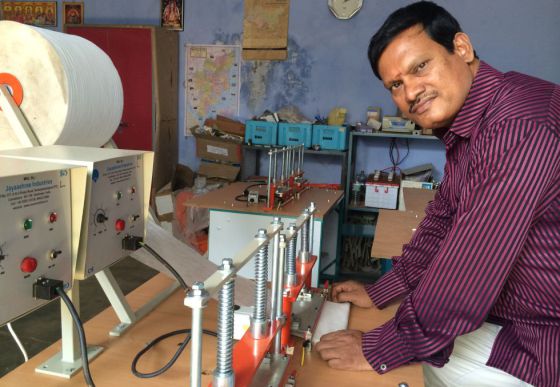
Inventor of a machine that produces low-cost sanitary napkins, Arunachalam Muruganantham. Photo courtesy of elpais.com.
Arunachalam Muruganantham was born into poverty in rural India, the son of a hand-weaver. His father died in a road accident, so Arunachalam dropped out of school to support his family, at age 14. Yet, in 2014, he was on Time Magazine’s list of the year’s 100 Most Influential People, having invented a machine to produce low-cost sanitary napkins.
Our story starts one day in 1998, when, early in Arunachalam’s arranged marriage, he saw his wife, Shanthi, hiding something behind her back. She told him it was “none of your business.” Nonetheless, he found they were dirty old rags she was saving to use for sanitary napkins. She explained that if she were to buy manufactured pads, they wouldn’t have enough money for food. He thought to himself that he wouldn’t even use those rags for cleaning, let alone for personal hygiene. It was a quite literal life-changing revelation that this was a reality for women in poverty across India, indeed across the globe. He went to purchase some pads for his wife and found they sold for about 40 times more then the goods used to produce them. At 28 years old, he had never even touched a pad before, let alone discussed the taboo subject. He realized how many women sacrifice their own personal comfort and needs for the needs of their household and the problem is well buried in the niceties of society.
Before Arunachalam dropped out of school, he had a great interest in science and won an award at an exhibition for a new chicken incubator design. Faced with this new pressing problem that was a daily issue for someone closest to him, he felt compelled to put his skills to use. It didn’t hurt that it was the beginning of his marriage, when, as he puts it, “most husbands are still trying to impress their wives.”
He decided to fashion a more affordable product for his wife and other women. He would spend hours after his day job as a welder on the problem, but he had trouble finding women to test the pads; most women were shy about discussing the subject, especially with an unrelated man. Even his wife and sisters eventually refused to participate. But instead of throwing in the towel, he began testing them himself using a bladder filled with animal blood. Once his avant-garde methods were discovered, he was ridiculed by the people in his village. After years of this work, his wife and mother also left him.
Things finally began to turn around in 2006 after Arunachalam had finished his creation, a machine that would produce low-cost sanitary pads. He ended up winning the National Innovation Foundation’s Grassroots Technological Innovations Award for his creation. Arunachalam began getting national press for his invention and seed funding to produce the machines. Each of Arunachalam’s machines costs around $1,100 dollars each to build and replace the multi-milllion dollar plants used by large corporations to produce the same product.
Rather than patent his work or try to make money from it, Arunachalam has made it his mission to bring affordable sanitary products and jobs to women all over the world. As he puts it:
If anyone runs after money, their life is not any beauty, it is boredom. People make billions and billions of dollars and then they go and work in philanthropy. But why do they not start philanthropy from day one?
From humble beginnings, and with a heart to help others, Arunachalam’s is a stunning example of dedication and perseverance. His machines are installed in 23 of 29 states in India and provide jobs to the many women who manufacture the products. Arunachalam now speaks all over the world about his project and has improved life and health for women globally. He has also reunited with his wife, mother, and daughter and is making plans to expand his project to 109 nations.
